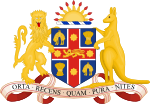Coroner's Court of New South Wales
| Coroner's Court of New South Wales | |
|---|---|
 |
|

The façade of the NSW State Coroner's Court in the early morning.
|
|
| Established | 1998 |
| Location | Parramatta Road, Glebe |
| Coordinates | 33°52′52″S 151°11′18″E / 33.8811282°S 151.1883183°ECoordinates: 33°52′52″S 151°11′18″E / 33.8811282°S 151.1883183°E |
| Composition method | Vice-regal appointment upon Premier's nomination, following advice of the Attorney General and Cabinet |
| Authorized by | Parliament of New South Wales via the Coroners Act 2009 (NSW) |
| Decisions are appealed to | Supreme Court of New South Wales |
| Judge term length | mandatory retirement by age of 72 |
| Website | coroners |
| New South Wales State Coroner | |
| Currently | Magistrate Michael Barnes |
| Since | 6 January 2014 |
The Coroner's Court of New South Wales is the court in the Australian state of New South Wales where legal proceedings, in the form of an inquest or inquiry, are held and presided over by the State Coroner of New South Wales (or NSW State Coroner), a Deputy State Coroner of New South Wales, or another coroner of the state of New South Wales.
Coroners must be magistrates in the state and sit in branches of the Local Court of New South Wales. They hold jurisdiction over the remains of a person and have the power to make findings in respect of the cause of death of a person or the cause of any fire in New South Wales.
Generally, there are no appeals from the decision(s) of a coroner; but, there is provision for the Supreme Court of New South Wales to order a fresh inquest or inquiry or to grant prerogative relief in respect of the proceedings.
The office of coroner in New South Wales derives from the legal framework inherited from the historical origins of the state and, ultimately, the United Kingdom. Admiral Arthur Phillip, the first governor of the Colony of New South Wales, was authorised by the British monarch to appoint such officials as were necessary for the administration of justice in the colony. This authority came to Phillip through what is commonly called the "second commission". One of the offices that he could appoint was that of coroner.
In the early days of the colony, the role of the coroner was often performed by a justice of the peace. The first inquiry in the nature of a coronial inquest was conducted on 14 December 1788 and was presided over by Augustus Alt, one of the first justices of the peace appointed by Phillip.
...
Wikipedia
